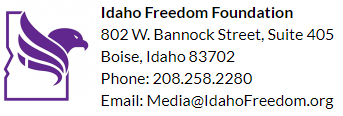
Idaho’s rising pension costs contribute to higher property taxes
By Wayne Hoffman
Idahoans fed up with skyrocketing property taxes hope state lawmakers will step in and offer relief. But raising the homeowner’s exemption, which reduces the taxable value of owner-occupied residences, is not the answer and never has been. Raising the exemption only shifts the rising tax burden from homeowners to other types of properties, including commercial real estate and rentals. This has a downstream impact on the cost of food, clothing, housing, cars, and so on.
In short, such a swap provides relief for some and drives up costs for others.
Better solutions abound. We can talk about cutting government waste, consolidating Idaho’s more than 1,300 taxing districts, or ending urban renewal. And we will.
Today, let’s start by discussing possible reform of a vexing source of government overspending. Did you know that starting last month, the Public Employee Retirement System of Idaho increased the amount Idaho taxpayers must pay, via their income and property taxes, to cover guaranteed retirement benefits for state and local government employees?
Most local governments—counties, cities, schools, highway districts, and so on—depend on the state’s 54-year-old pension system, PERSI, to pay out retirement benefits for their workers. Idaho’s pension system, like all defined-benefit retirement plans, requires employers to contribute to their employees’ retirement accounts, matching the employee’s own contribution up to a certain percent. In the case of government employees, their employer is the people of Idaho, and the employer match is funded by taxes.
Yet compared to private retirement options, such as 401k plans, the government takes a massive amount from both employers (the taxpayers of Idaho) and employees (government workers) to fund the public retirement system.
For general government employees, Idaho taxpayers contribute an amount equal to 11.94 percent of the employee’s wages. For police and fire employees, the employer—read: taxpayer—contribution rate is now 12.28 percent.
Government employees also contribute a portion of their paychecks to the state pension system, and those mandatory contribution rates also went up last month. They’re above 7 percent for most employees and nearly 9 percent for police and fire. Last month’s pension contribution rate increase further complicates matters for local government officials who may feel compelled to raise salaries in order to keep their employees’ paychecks from evaporating due to rising pension deductions. In some cases, local government officials opt to have taxpayers cover both the employer and employee contributions.
If you’re keeping track, you’ll note the pension system takes about 20 percent of each government employee’s paycheck, the highest it’s ever been. That’s far more than the typical private sector employee retirement plan.
Fixing the state pension system for new employees and Idaho taxpayers while keeping the promises made to current government employees and retirees should be a priority for legislators.
Proponents of the state’s pension system will usually tell you Idaho has one of the best-funded government retirement systems in the country. And they’re not wrong. But Idaho’s pension system is the metaphorical skinniest kid at fat camp. Like other states, Idaho’s pension system has a growing unfunded liability.
Moreover, the contribution rates, high as they are, really aren’t high enough to close the underfunded liability gap. Idaho’s pension problems will get a lot bigger once the economy slows, and the investments that underpin the retirement benefits lose value. When that happens, the government will again squeeze taxpayers, who will likely be struggling to fund their own nest eggs amidst market slowdowns, to make up the difference.
Idaho’s property tax crisis is an opportunity to fix the problems contributing to the crisis, not bury the problem with phony solutions such as raising the homeowner’s exemption. The expensive state pension program should be part of the discussion.
Wayne Hoffman is President of the Idaho Freedom Foundation

From: idahofreedom.org